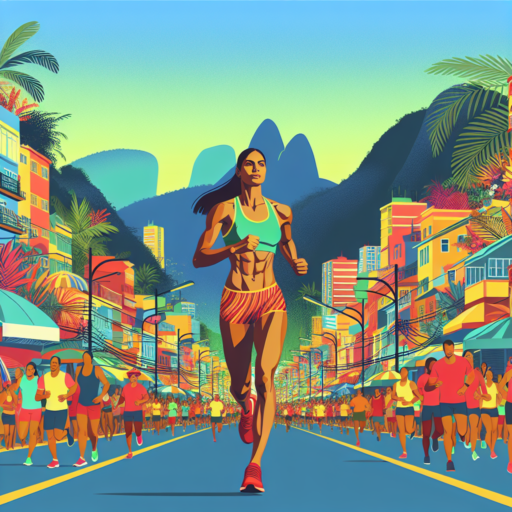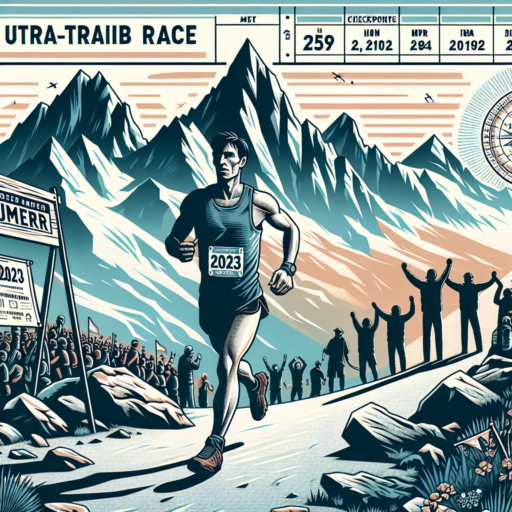Who is the Best Brazilian Marathoner of All Time?
When discussing the pantheon of Brazilian long-distance runners, the conversation inevitably gravitates towards one name: Vanderlei Cordeiro de Lima. Although Brazil has produced several noteworthy marathoners, de Lima’s achievements, particularly in the face of adversity, have cemented his status as an iconic figure in the sport.
In 2004, during the Athens Olympic Games Marathon, an event that would become a defining moment in marathon history, de Lima was leading the race with a substantial margin. However, in an unforeseen turn of events, he was attacked by a spectator, which dramatically affected his pace and position. Despite this setback, de Lima showcased his resilience by finishing the race and earning the bronze medal. This act of sheer determination and sportsmanship elevated him in the eyes of many to legendary status, not just in Brazil, but globally.
Aside from his Olympic bronze, de Lima has an impressive resume that includes victories in major international marathons and numerous other podium finishes. His career highlights the qualities of persistence, endurance, and grace under pressure—traits that are emblematic of marathon running. Through his achievements and distinctive sportsmanship, Vanderlei Cordeiro de Lima has etched his name as the best Brazilian marathoner of all time.
The Training Secrets of Top Brazilian Marathon Runners
The allure of Brazil’s top marathon runners isn’t just in their speed or stamina—it lies deep within their unique training regimens. These athletes incorporate a balanced mix of rigorous physical training, smart nutrition, and mental preparation techniques that set them apart on the global stage.
Physical Training Techniques: The foundation of their success begins with a diverse training schedule. It is not solely about logging miles. These runners integrate interval training, hill sprints, and long-distance runs at varied paces to enhance their endurance and speed. Additionally, strength training and flexibility exercises play a crucial role in preventing injuries and improving overall performance.
Nutritional Strategy: Proper nutrition is the fuel that powers these athletes. Far from adhering to a one-size-fits-all diet, Brazilian marathon runners focus on a customized eating plan rich in carbohydrates, proteins, and healthy fats. Hydration before, during, and after training and races is also meticulously managed, emphasizing the importance of electrolyte balance in endurance sports.
Mental Toughness Techniques: Perhaps the most distinctive aspect of their training involves mental preparation. Techniques such as visualization, meditation, and setting small, achievable goals are integral to their regimen. This not just helps in enhancing focus during races but also in overcoming the psychological barriers associated with marathon running.
How to Train Like a Brazilian Marathoner: A Step-by-Step Guide
Brazilian marathoners are renowned for their discipline, strength, and endurance, traits that have placed them among the best in long-distance running worldwide. Training like a Brazilian marathoner involves a comprehensive approach, focusing on not just physical stamina, but also mental fortitude. This step-by-step guide outlines the primary components of a training regime that mirrors the Brazilian method, aiming to improve your marathon performance significantly.
Step 1: Embrace the Discipline of Regular Training
Regular training is the bedrock of any marathon preparation, and Brazilian marathoners are known for their unwavering commitment to their training schedules. It’s not just about the quantity of the training but the quality. Integrate a mix of long runs, interval training, and recovery runs into your weekly routine to build endurance, speed, and efficient recovery time, respectively. Always remember, consistency is key to gradually increasing your mileage without risking injury.
Step 2: Focus on Strength and Flexibility
Brazilian athletes give significant importance to strength and flexibility training, understanding that these are crucial for enhancing performance and preventing injuries. Incorporate exercises like bodyweight workouts, core strengthening exercises, and yoga or Pilates for flexibility into your routine. Such practices are instrumental in building a solid foundation that supports the rigors of marathon running.
In the quest to train like a Brazilian marathoner, tailor your regimen to mirror the dedication, balance, and holistic approach practiced by these elite athletes. By adopting their disciplined training schedule, strength and flexibility focus, and comprehensive preparation strategy, you’re setting a robust framework for marathon success.
The Top 5 Brazilian Marathon Races Every Runner Should Know
Brazil isn’t just famous for its vibrant culture, beautiful landscapes, and soccer passion; it’s also a hotspot for marathon runners seeking unique races. From the iconic streets of Rio de Janeiro to the breath-taking views of São Paulo, Brazil’s marathon scene offers something for every runner. Whether you’re an experienced marathoner or a newcomer to the running world, these top 5 Brazilian marathon races are events you won’t want to miss. Each race brings its own challenges and highlights, ensuring a memorable experience for participants.
1. Rio de Janeiro Marathon
Undoubtedly one of the most scenic marathons in the world, the Rio de Janeiro Marathon takes runners through famous beaches such as Copacabana and Ipanema. The race’s picturesque route along the coastline offers breathtaking views of Sugarloaf Mountain and the Christ the Redeemer statue, standing as a test of endurance and spirit in the face of Rio’s humid climate.
2. São Paulo Marathon
The São Paulo Marathon is known for its vibrant atmosphere and challenging course. The race weaves through the city’s bustling streets, passing iconic landmarks and introducing runners to the heart of Brazil’s financial capital. Despite its demanding route, the electric energy of São Paulo and the enthusiastic spectators make this marathon a must-experience for every running enthusiast.
3. Foz do Iguaçu International Marathon
For those looking for a truly unique experience, the Foz do Iguaçu International Marathon offers just that. Running in the vicinity of the spectacular Iguazu Falls, one of the New Seven Wonders of Nature, this marathon combines natural beauty with the thrill of the competition. The race is not only a physical challenge but also a journey through one of the most awe-inspiring landscapes on earth.
Discovering Brazil Through Marathon Running: From Rio to São Paulo
Exploring the Vibrant Cities on Foot
Marathon running in Brazil offers an unparalleled opportunity to see the country’s two most iconic cities like never before. Whether it’s the picturesque landscapes of Rio de Janeiro with its world-renowned beaches and the towering Christ the Redeemer statue, or the cosmopolitan charm of São Paulo, the financial heartbeat of Brazil, running a marathon through these cities is not just a test of endurance, but a unique way to immerse oneself in Brazilian culture and scenery.
The Rio de Janeiro Marathon: A Scenic Route Through History
The Rio Marathon is famed for its breathtaking route, which takes runners on a journey past the city’s most famous landmarks. From the starting point at Recreio dos Bandeirantes, participants pace through the iconic stretches of Ipanema and Copacabana beaches. The sight of Sugarloaf Mountain and the sounds of the Atlantic Ocean accompany runners, making it a marathon experience defined by its scenic beauty and vibrant atmosphere.
The São Paulo Marathon: An Urban Adventure
Conversely, São Paulo’s marathon showcases the city’s urban essence. The race starts in Jockey Club and winds through bustling streets, towering skyscrapers, and lush parks, reflecting São Paulo’s diverse character. Runners pass by historical landmarks and modern architectural marvels, experiencing the city’s dynamic pulse. The São Paulo Marathon is more than a race; it’s an exploration of Brazil’s rich culture, innovation, and the spirit of its people.
No se han encontrado productos.
Inspiring Stories of Brazilian Marathon Success
The world of long-distance running has seen remarkable athletes come from every corner of the globe, but the tales of Brazilian marathoners stand out for their sheer determination and success. These inspiring stories not only highlight the athletes’ relentless pursuit of excellence but also shed light on Brazil’s growing prominence in the world of marathon running.
One such story is that of Marilson dos Santos, a Brazilian long-distance runner who achieved international acclaim by winning the New York City Marathon twice. His victories in 2006 and 2008 showcased not only his personal triumph but also marked a significant milestone for Brazilian marathon running on the global stage. Dos Santos’ journey from humble beginnings to marathon stardom serves as a powerful inspiration for aspiring runners everywhere.
Another noteworthy athlete is Giovani dos Santos, who has carved out a name for himself in the world of long-distance running. His performances in marathons across the globe have demonstrated the high level of talent emerging from Brazil. Giovani’s dedication and hard work epitomize the spirit of Brazilian marathoners, making his story a compelling chapter in the country’s athletic narrative.
Nutrition and Diet Tips from Elite Brazilian Marathon Runners
Discovering the secrets behind the success of elite Brazilian marathon runners leads us directly to their nutrition and diet strategies. These athletes adhere to dietary plans that are meticulously designed to enhance performance, ensure rapid recovery, and maintain overall health. In this article, we delve into the core components of their nutrition regime that anyone looking to improve their distance running can adopt.
Optimal Hydration is fundamental, with a focus on maintaining balance throughout training and competitions. Brazilian runners often emphasize the importance of not just water intake but also incorporating electrolyte-rich fluids to counteract the loss of minerals during long runs. Tailoring hydration strategies according to weather conditions and individual sweat rates is a technique mastered by these athletes.
Key Nutrients in Their Diet
Carbohydrates play a vital role in the diet of Brazilian marathon runners, acting as the primary source of energy for endurance. They prioritize complex carbs found in whole grains, fruits, and vegetables to ensure a steady release of energy. Proteins, essential for muscle repair and recovery, are carefully integrated into their meals through lean meats, beans, and dairy products. Healthy fats from nuts, seeds, and avocados are incorporated to support overall health and energy levels.
Ultimately, the secret to the marathon success of Brazilian runners lies not just in their rigorous training routines but significantly in their sophisticated approach to nutrition and diet. Incorporating these elements into your own training may not turn you into an elite athlete overnight, but it can markedly improve your performance and recovery.
The Future of Brazilian Marathon Running: Emerging Talents to Watch
The landscape of Brazilian marathon running is currently undergoing an exciting transformation, driven by the emergence of new talent destined to make significant marks on both the national and international stages. As the country has traditionally shown prowess in long-distance running, the spotlight is now on the young athletes who are bringing fresh energy and determination to the sport. These individuals are not just running; they’re redefining what it means to be a marathon runner from Brazil, blending speed with endurance in ways previously unseen.
Among the promising talents, there are a few names that stand out for their remarkable achievements at such young ages. These athletes have not only broken records but have also shown unique resilience and dedication, traits that suggest their potential to excel in upcoming global competitions. Their training methodologies, coupled with an unyielding spirit, make them not just athletes to watch but also sources of national pride.
The development of these emerging talents is a testament to the evolving infrastructure and support systems for athletics in Brazil. Initiatives aimed at nurturing young talent have become more prevalent, providing these athletes with the resources they need to succeed. This support ranges from advanced training facilities to exposure to international competition, crucial factors in the grooming of world-class marathon runners.
Comparing Brazilian Marathoners to the World’s Best: A Close Look
When examining the realm of long-distance running, Brazilian marathoners have consistently demonstrated their prowess and resilience. However, when their performances are juxtaposed with those of the world’s best marathon runners, various intriguing patterns and differences emerge. This comparison sheds light not only on the training methodologies and physical endurance of Brazilian athletes but also on the broader context of marathon running on a global scale.
One notable aspect of this comparison involves evaluating the achievements and records held by Brazilian marathoners in international competitions. Brazilian athletes, such as Marilson dos Santos, who has triumphed in the New York City Marathon, illustrate the high caliber of talent emanating from Brazil. Nonetheless, when compared to world record holders and Olympic medalists from countries like Kenya and Ethiopia, the disparity in terms of world records and consistent podium finishes becomes apparent. This discrepancy highlights the rigorous training regimens and altitude advantages that East African runners benefit from.
Impact of Environmental and Training Differences
The environmental conditions and training facilities available to Brazilian marathoners and their counterparts in other parts of the world significantly influence their performance levels. Athletes training in regions with high altitudes, such as the Rift Valley in Kenya, gain a natural advantage in terms of lung capacity and endurance. In contrast, Brazilian runners often train in conditions that are vastly different, focusing more on technical skills and adaptability to varying climates and terrains. This contrast in training environments contributes to the nuanced performance differences seen on the international stage.
Where to Find the Best Training Programs for Brazilian Marathoners
Finding the best training programs for Brazilian marathoners is crucial for athletes who are serious about improving their performance and achieving their running goals. Brazil hosts a vibrant running community, with a plethora of options available for those looking to push their limits. From Rio de Janeiro’s picturesque routes to Sao Paulo’s competitive clubs, the options are both broad and specialized, catering to different needs and preferences.
For marathoners in Brazil looking for structured guidance, the Sociedade Esportiva Palmeiras in Sao Paulo offers one of the top training programs. This program is renowned for its comprehensive approach to marathon training, integrating both physical and mental preparation strategies. Meanwhile, in Rio de Janeiro, the Clube de Corrida is celebrated for its personalized training schedules and expert coaching, providing marathoners with the tools they need to excel.
Additionally, online resources have become increasingly popular among Brazilian marathoners seeking flexibility in their training. Platforms such as Runkeeper and Strava offer virtual training programs, connecting runners with coaches and communities that share their goals and challenges. These platforms not only offer personalized training plans but also enable athletes to track their progress and compete with others for an added motivational boost.




